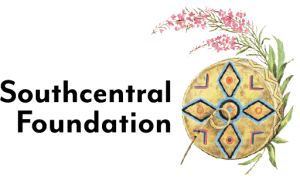Urgent Maternal Warning Signs: Recognizing and Responding to Complications
By Senior Marketing Specialist Emma Irish

Southcentral Foundation supports mothers and parents in every stage from prenatal to postpartum and beyond.
Pregnancy and childbirth are life-changing experiences. Southcentral Foundation has resources to support mothers and parents in every stage from prenatal to postpartum and beyond. Specifically, the Maternal-Fetal Medicine Clinic is a comprehensive practice that serves Alaska Native and American Indian women and their families who have high-risk pregnancies. MFM providers offer compassionate care for pregnant women with chronic health conditions and unexpected problems during pregnancy while their body changes and their baby grows. The clinic collaborates with the expecting mother, her family, and her medical team to achieve the best possible outcome.
While most pregnancies progress without complications, some women may experience situations that require immediate medical attention. Recognizing the signs to seek medical care when something is off is critical to preventing outcomes that may include long-term health issues or even become life-threatening to mother and baby. Education and awareness around these signs can save lives.
Urgent maternal warning signs are symptoms that may indicate a serious complication during pregnancy, childbirth, or in the postpartum period. These warning signs can develop suddenly and may progress quickly. According to the Centers for Disease Control and Prevention, maternal mortality in the U.S. remains a serious concern. The good news is that many negative outcomes are preventable with early recognition, and timely intervention.
One of the most critical warning signs is a severe headache that does not go away, especially if it is accompanied by blurred vision or swelling. This could be a sign of preeclampsia, a potentially life-threatening condition involving high blood pressure that can lead to organ damage. Chest pain or shortness of breath are other urgent symptoms which might signal a pulmonary embolism — a blood clot in the lungs that can quickly become fatal if untreated.
Severe abdominal pain that does not improve or worsens may point to a ruptured uterus, ectopic pregnancy, or placental abruption — all of which require immediate medical intervention. Similarly, heavy vaginal bleeding, particularly if it soaks through more than one pad per hour or contains large clots, is another red flag. This could indicate postpartum hemorrhage, a leading cause of maternal death.
Women should also seek help if they experience thoughts of harming themselves or their baby; potential signs of postpartum depression or another perinatal mental health condition. Mental health is as important as physical health, and any changes in mood, behavior, or mental state should not be ignored.
Other important symptoms include high fever, seizures, persistent vomiting, difficulty breathing, and sudden swelling of the hands, face, or legs. These signs could be related to infections, gestational hypertension, or other serious issues that need prompt evaluation.
If you have any of these symptoms during or after pregnancy, contact your primary care team right away. If you are not able to reach your provider, go to the nearest emergency department. Remember to share that you are pregnant or have been pregnant within the last year. Early detection can result in better health outcomes for both mother and baby.
Understanding urgent maternal warning signs is essential for protecting maternal health. If you or a family member have concerns about symptoms during pregnancy, contact OB Triage at 907-729-4142, or visit your nearest emergency department.


